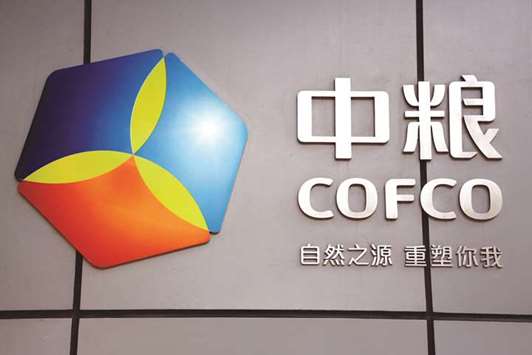China’s COFCO International is in the throes of a staffing upheaval as the group pursues its professed ambition of sitting at the top table of global agricultural traders.
But doubts persist among some in the industry over whether the trading firm will really challenge the existing four dominant players in grains, oilseeds and sugar.
In the end, they suspect, it may prioritise securing strategic food supplies for China over commercial aims in an era of rising trade tensions.
State-owned conglomerate China National Cereals, Oils and Foodstuffs Corp began building its foreign commodities operations in 2014 and formally launched the COFCO International Ltd (CIL) trading division in April last year.
Its assets include port facilities in Brazil and Romania, sugar mills in Brazil and grain silos across the globe.
Last month Yu Xubo, president of the Beijing-based parent COFCO Group, laid out a bold expansion. “We aim to become the largest international food trader by 2020, not only in assets we own and revenues we make, but also in the quality of our assets, business operation, and return on investment,” he told the official China Daily. COFCO Group, which has interests that include hotels, real estate and some of China’s leading food and drink brands including Great Wall wine, reported revenue of 344.796bn yuan ($53bn) in the first nine months of 2017.
Reflecting progress towards its targets, by the middle of last year the group was already the second biggest grain exporter from Argentina, one of the world’s top food producers. China is securing its global supply lines, moving into mining ventures in Africa, expanding its ocean shipping fleet and buying ports around the world.
This effort is accelerating under President Xi Jinping’s trillion-dollar Belt and Road initiative involving huge infrastructure projects connecting China to Europe and beyond. But COFCO International – in which Singapore, London-based Standard Chartered and the World Bank’s commercial arm also hold stakes – has spent most of the past year integrating past purchases rather than expanding.
This process has been painful at a difficult time for all traders.
Four years of bumper global grains and oilseeds harvests have squeezed profits at the established players: Archer Daniels Midland Co, Bunge, Cargill Inc and Louis Dreyfus Co, known as the “ABCDs” due to their initials.
“It has been a challenging period,” said one source with knowledge of COFCO International’s strategy.
But the source told Reuters the worst was over, with the trader poised to try to take market share from rivals. “The big ambition is still there – to be the new C of the ABCDs.”
COFCO International has been trying to integrate two purchases, together worth more than $3bn, that it agreed three years ago – of Rotterdam-based grain trader Nidera and the agribusiness of Singapore-listed Noble Group.
This has meant heavy job losses.
A company official said last month that over 2,500 jobs had been shed in its Brazilian sugar operations alone, with further cuts expected there, although this was separate from the integration process.
COFCO Group has also sent a team of managers from Beijing to take pivotal roles in operations across the globe, including in Canada, Brazil and Europe, company memos seen by Reuters showed.
A spokesman for Geneva-based COFCO International said around 50 of its staff are former COFCO Group employees, although he noted this was out of a total workforce that exceeds 13,000.
The spokesman declined to comment further on human resources issues.
Chief executive Johnny Chi, who held top positions with COFCO Group in China, has overseen the departure of several top staff at Nidera, from which the trader inherited big losses.
These included a $150mn financial hole in its Latin American operations and $200mn in unauthorised trading losses on its biofuels desk.
Company memos show Chi has been followed by Frank Feng, appointed chief risk officer for South America and Lucas Shi, who has taken the same role at a regional level in the “Southern Cone” countries including Argentina.
Another recruit from Beijing is Dong Guo, who has become chief research officer. Sources said Nidera teams have been shrunk or removed in Europe and North America. This followed a management reshuffle in Brazil after the accounting irregularities.
The firm has also hired high profile figures from the industry, with Pierre Lorinet, former chief financial officer at trade house Trafigura, and Serge Schoen, an ex-Louis Dreyfus chief executive, both joining its board. Whether the firm has achieved a turnaround yet is unclear.
No profit and loss accounts are available for COFCO International, in which the Beijing parent holds 48% and the sovereign wealth fund China Investment Corp 12%.
COFCO International announced in November an agreement to sell its crop seeds business to Swiss-based Syngenta AG – which has been bought by ChemChina – but did not disclose price terms.
“The seeds sale has boosted the balance sheet,” a second source said.”2017 has been an effective year and COFCO International is back on track and can start thinking again about growing.”
COFCO has said it will pursue partnerships to expand overseas after signing a supply deal with US cooperative Promark last year. One former COFCO International manager who left in the past year said the firm had been struggling over how to cut costs and ensure future revenues after shedding people who had been making it money.
Other problems lay in overcoming cultural differences across its global operations.

COFCO Group, which has interests that include hotels, real estate and some of China’s leading food and drink brands, reported revenue of 344.796bn yuan ($53bn) in the first nine months of 2017.
